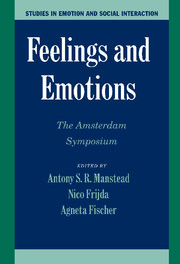Book contents
- Frontmatter
- Contents
- List of Contributors
- 1 Introduction
- PART I THE NATURE OF FEELINGS AND EMOTIONS
- PART II BASIC PSYCHOLOGICAL PROCESSES IN FEELINGS AND EMOTIONS
- 8 What We Become Emotional About
- 9 Feelings Integrate the Central Representation of Appraisal-driven Response Organization in Emotion
- 10 Emotions and Action
- 11 Basic Affects and the Instinctual Emotional Systems of the Brain
- 12 Exposure Effects
- 13 Feeling States in Emotion
- PART III FEELINGS AND EMOTIONS: THE PLACE OF PLEASURE
- PART IV FEELINGS AND EMOTIONS IN THEIR SOCIOCULTURAL CONTEXT
- PART V FEELINGS, EMOTIONS, AND MORALITY
- Subject Index
- Author Index
- Plate section
- References
9 - Feelings Integrate the Central Representation of Appraisal-driven Response Organization in Emotion
Published online by Cambridge University Press: 05 June 2012
- Frontmatter
- Contents
- List of Contributors
- 1 Introduction
- PART I THE NATURE OF FEELINGS AND EMOTIONS
- PART II BASIC PSYCHOLOGICAL PROCESSES IN FEELINGS AND EMOTIONS
- 8 What We Become Emotional About
- 9 Feelings Integrate the Central Representation of Appraisal-driven Response Organization in Emotion
- 10 Emotions and Action
- 11 Basic Affects and the Instinctual Emotional Systems of the Brain
- 12 Exposure Effects
- 13 Feeling States in Emotion
- PART III FEELINGS AND EMOTIONS: THE PLACE OF PLEASURE
- PART IV FEELINGS AND EMOTIONS IN THEIR SOCIOCULTURAL CONTEXT
- PART V FEELINGS, EMOTIONS, AND MORALITY
- Subject Index
- Author Index
- Plate section
- References
Summary
ABSTRACT
From antiquity, most philosophers and psychologists have implicitly assumed that the nature of an individual's emotional experience is determined by his/her subjective interpretation of the eliciting event. Appraisal theories of emotion, pioneered by Arnold and Lazarus, have made this assumption explicit and have generated empirically testable hypotheses on emotion-specific appraisal profiles and their effects on physiological responses, motor expression, and feeling states. Current appraisal theories will be critically reviewed and compared to competing theories. A number of central issues of debate will be highlighted. The research evidence in this domain will be summarized, illustrated by a number of representative experiments from the Geneva Emotion Research Group. Special emphasis will be given to models of the appraisal process that attempt to tie into current developments in cognitive science and dynamic systems modeling.
The very title of the Amsterdam Symposium, “Feelings and Emotions,” implies that these two terms should not be used as synonyms: The copula suggests that they are different and distinguishable. Unfortunately, the need to define these two concepts differentially has not always been heeded by scholars in this area and much confusion has been the result. One can argue, for example, that the famous James–Cannon debate is due to James's using the term “emotion” when he probably meant “feeling” (see Scherer, 2000a, pp. 155–156). There is an unabated tendency to use these two terms interchangeably, and further misunderstanding, followed by futile debate, can be predicted.
- Type
- Chapter
- Information
- Feelings and EmotionsThe Amsterdam Symposium, pp. 136 - 157Publisher: Cambridge University PressPrint publication year: 2004
References
- 92
- Cited by



